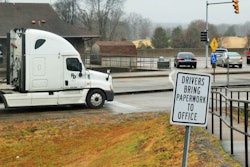Trucking news and briefs for Tuesday, June 11, 2024:
FMCSA extends Baltimore bridge collapse emergency declaration
The Federal Motor Carrier Safety Administration is again extending its emergency declaration related to the Francis Scott Key Bridge collapse in Baltimore.
A state of emergency was declared in the aftermath of the collapse on March 26. On April 4, FMCSA issued an extension of the waiver through May 8 granting specific regulatory relief. On May 7, the agency extended the waiver for another month, through June 8. Now, FMCSA is once again extending the declaration through June 22.
As previously reported, the following motor carriers and drivers are exempt from the maximum driving time regulations in 49 Code of Federal Regulations Part 395.3:
Those providing direct assistance to the restoration and reopening efforts at the Port of Baltimore transporting equipment and supplies related to immediate repairs to the roadways and navigable waterways adjacent to the port
Those providing transportation related to the removal of wreckage and debris from the waterways providing access to the port
Additionally, carriers and drivers transporting commodities rerouted from the Port of Baltimore to other East Coast ports because of the collapse, including fuel and intermodal freight, such as shipping containers and their contents, automobiles or other equipment transported in roll-on roll-off operations such as heavy duty machinery and farm equipment are granted emergency relief from the maximum 11-hour driving time in 49 CFR Part 395.3(a)(3)(i), up to a maximum of two additional hours.
Carriers and drivers hauling fuel (gasoline, ethanol, propane, natural gas, and heating oil) from Maryland’s Curtis Bay terminal (within the Baltimore Marine Terminal area) for delivery to the following locations within Maryland: Anne Arundel, Baltimore City, Baltimore County, Carroll County, Cecil County, Frederick County, Harford County, Howard County, Queen Anne’s County, and Washington County are also exempt from the maximum 11-hour driving time, up to a maximum of two additional hours.
Finally, drivers and carriers in the above operations who are not currently required to use an electronic logging device and don’t have an ELD installed, including those currently operating under the short-haul operations exception, are allowed to operate without an ELD for keeping logs. Such carriers and drivers are required to maintain paper logs and supporting documents while operating under the exemption.
FMCSA said it will continue to monitor the status of the emergency and modify the declaration if necessary.
[Related: Equipment, auto haulers may feel strain from Baltimore bridge collapse]
Fleet seeks waiver to allow under-21 intrastate drivers to operate in another state
3 North LLC, which according to FMCSA’s SAFER snapshot is a 23-truck private fleet out of Brookfield, Wisconsin, is requesting a waiver to allow three of its intrastate drivers under the age of 21 to operate in a different state.
Federal regulations require that CDLs issued to drivers under the age of 21 be marked with a “K” restriction limiting them to intrastate operations in the driver’s state of domicile.
3 North utilizes a fleet of specialized construction equipment mounted on a straight truck chassis to transport concrete for wind turbine foundations. The company said that it uses a different set of CDL holders to drive the CMVs across state lines. Once the trucks are across state lines, the company is asking FMCSA to allow it to use its three under-21 drivers to operate the trucks in the state where the work is being performed.
“The applicant believes their operations would have no impact on the safety of U.S. highways because the three drivers will operate the CMVs for only 20 miles in one state once the CMVs have been driven from one state to another,” FMCSA’s Federal Register notice says. “The applicant believes that, absent the exemption, the progress towards green, renewable energy could be delayed, potentially causing the energy sector to postpone its transition away from carbon-generating sources of power.”
The agency is accepting public comments on the request for 30 days beginning Tuesday, June 11. Comments can be filed at www.regulations.gov by searching Docket No. FMCSA-2024-0125.
Oregon wants limited waiver from proof of citizenship, residency rules
The Oregon Department of Transportation has applied for a limited exemption from the commercial driver’s license (CDL) rules concerning acceptable proof of citizenship or lawful permanent residency for citizens of Freely Associated States (FAS) who now reside in Oregon and wish to obtain a CDL. The FAS are the Federated States of Micronesia, the Republic of the Marshall Islands, and the Republic of Palau.
If the exemption is granted, Oregon would be allowed to issue standard commercial learner permits (CLPs) and CDLs to these individuals, rather than issuing non-domiciled CLPs and CDLs.
According to FMCSA’s Federal Register notice, the United States’ relationships with the FAS are governed by agreements known as Compacts of Free Association (COFA). Under these agreements, citizens of the FAS may enter the United States as nonimmigrants, and, without obtaining a visa, they may remain in and work in the country indefinitely.
Oregon is requesting that FMCSA grant the proposed exemption and authorize it to issue CDLs and CLPs to citizens of the FAS in accordance with state procedures in 49 Code of Federal Regulations 383.73(a) and (b). Ordinarily, a person who is not a United States citizen must present a valid, unexpired Permanent Resident Card. For a person who is a citizen of a FAS, Oregon would instead accept a valid, unexpired passport issued by a FAS and an Arrival/Departure Record, meaning an I-94 or I-94A form, to prove that the individual has entered the United States lawfully.
FMCSA will accept public comments on the request for 30 days beginning June 11 at www.regulations.gov by searching Docket No. FMCSA-2023-0266.
PGT opens new Kentucky, South Carolina facilities
PGT Trucking (CCJ Top 250, No. 87) announced the launch of two new facilities in Ghent, Kentucky, and Spartanburg, South Carolina, expanding the company's operational reach in the Southeast.
"PGT Trucking is excited to open two new terminals, providing increased service opportunities for our customers and drivers in the Southeast," said Chad Marsilio, PGT Trucking Chief Operating Officer. "Through PGT Ghent and PGT Spartanburg, our customers can expect safe, reliable and quality transportation solutions to move their freight. PGT's Proud Professional Drivers will also benefit from these centralized hubs."
PGT Ghent, located at 3738 U.S. Highway 42 West, boasts five acres, including ample truck parking and a brand-new building with an operations center, driver lounge and shower amenities. The facility is also near several prominent steel and building product customers, who can expect to see an increase in PGT's operational capability in the region. PGT Ghent is operated by PKM Transportation Services.
PGT Spartanburg, located at 615 Simuel Road, features an office space, driver lounge, on-site parking and maintenance facility. Through this terminal, PGT can provide enhanced port delivery services, ensuring the safe and timely transportation of overseas cargo, while supporting the company's strong fleet of professional drivers in the Southeast.













